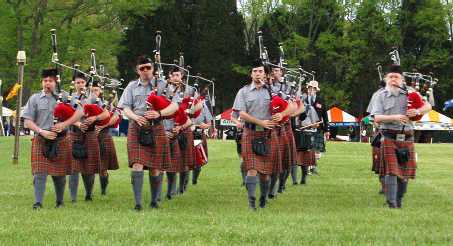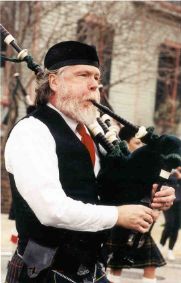 |
 |
 |
|
|
|||
|
Bruce Carson Wright Bagpipe and Practice Chanter Lessons
and Classes |
|||
|
No prior musical instruction needed. |
|||
|
|
||
| The bagpipes are woodwind
instruments that are distantly related to
the oboe, clarinet, and saxophone.
Unlike most woodwinds they have multiple
reeds, typically 4, one single reed for each
of the three "drones" which are the pipes
that rest on the piper's shoulder (or for
many small pipes are held roughly
horizontally in front of the piper) and
which play a constant background chord, and
one double reed for the chanter, which is
the pipe that carries the melody. All
of these reeds are contained in small reed
chambers and are not obviously visible
unless you take the pipe apart. The chanter is played much like any other woodwind instrument; the piper's fingers move to cover and uncover the holes in order to make the notes - however the pipes present a couple of unique challenges to the musician. To begin with, because the bag produces a continuous stream of air, techniques like "tonguing" the mouthpiece to momentarily stop the air flow and separate the notes are not available. Secondly, most pipes are not able to play louder or softer without going out of tune. Because of this, a number of techniques have been developed to provide "articulation" between notes and some kind of "emphasis" on the strong notes. The most obvious of these are grace notes, which are short notes that separate two melody notes. Sometimes several grace notes are combined into a more complex sequence that pipers call an "embellishment." Orchestral wind musicians do use analogous movements, but they are not needed nearly as often as on the bagpipe - in fact, it is hardly possible to play even the simplest tune on the bagpipe without using at least a few grace notes, while with orchestral wind instruments a student may not learn about grace notes for years. The effect of this is that the finger work required to play the pipes at even a basic level is fairly demanding. Normally, a beginning student starts out learning how to play the bagpipe by working with a "Practice Chanter" (which pipers often call a "PC"). This is a small instrument somewhat similar to a recorder that uses the same fingering as a pipe chanter. Using the Practice Chanter has several advantages:
Once the student can play a few tunes reasonably well on the practice chanter, they can progress to the full pipes. Often it is possible to find good used pipes much cheaper than a new set; also if you are interested in playing with a band, many bands have loaner pipes that they can hand out to beginning pipers. Most beginning pipers start out on the pipes playing only the chanter, and then add one drone at a time as they develop their stamina and coordination until they are playing all three. Piping students who reach a reasonable level of proficiency on the pipes may want to consider playing with one of the bands in the area. As part of my role as piping instructor for the North Carolina State University Pipes and Drums Grade 4 band, I work with the novice pipers who are transitioning into playing with the band. Typically it takes about 2 years for a student to go from starting out on the practice chanter until they're playing in public either solo or with a band, although there are exceptions in both directions. I am often asked what ages are appropriate for learning the pipes. Generally speaking, anyone over about the age of 8 can start learning the pipes - much below about 8, many children's hands are too small and they don't have a long enough attention span. No two youngsters are identical however, and a few children have started as young as 6. There really is no upper limit to learning, and I've worked with some students who were in their late 70's - so we can probably say that it's appropriate for ages 8-80. As with anything else, younger students can often make faster progress, as can those who have prior musical experience. Like any other musical instrument, it does require practice. Regular daily practice is much better than trying to "cram" an entire week's work into one session. Most people won't make much progress if they can't devote at least 30 minutes a day to practice, and 45 minutes to an hour is better. However, it is not necessary for this to be done all in one session - in fact, since frequency is very important, it can be beneficial to have several 15 minute sessions every day. If you can find a few minutes in the morning, a few more minutes at your lunch hour, and then some more in the evening, you'll probably do OK. If you can't find any time at all, you should probably take up some other pastime. |
||
| Located
in the Triangle area of North Carolina - Durham,
Raleigh, Chapel Hill, and Cary. Available for events throughout the Carolinas and Virginia. |
||
|
|
||
| Phone: (919) 286-9206 Cell: (919) 943-9289 |
Email me | |||||
|
||||||
Useful Links:
|
||||||
 Hire Bagpipers |
 Gigmasters - Booking Bagpipers Online Since 1997 |
|
||||



